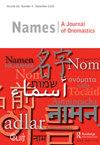The Linguistics of Name Translation: Preferred Personal and Business Names in English, Korean, and Chinese
IF 0.6
3区 文学
0 LANGUAGE & LINGUISTICS
引用次数: 0
Abstract
This research examines personal and business names and their translations among typologically contrastive languages: English, Korean, and Chinese. A linguistic framework is proposed that predicts and tests whether and how ideal translations will be based on sound or meaning, as defined by the phonetic or semantic features of the given orthography. Two separate surveys (online in the US and onsite in Korea) were taken about preferred translations of names from and to the three languages. The linguistic prediction was borne out by the survey results: sound translation is preferred from and to English, meaning translation from and to Chinese, and preference is mixed from and to Korean. An additional finding was that translation preference was sound-based for personal names but meaning-based for business names. The full list of 118 original names and 302 translation choices in the three languages investigated in this study is provided in the appendix.名字翻译的语言学:英语、韩语和汉语中个人和企业的首选名称
本研究考察了个人和企业名称及其在类型学上对比的语言:英语、韩语和汉语中的翻译。本文提出了一个语言框架来预测和测试理想的翻译是否以及如何基于语音或意义,根据给定正字法的语音或语义特征来定义。两项独立的调查(美国的在线调查和韩国的现场调查)针对这三种语言的名字的首选翻译进行了调查。调查结果证实了语言学上的预测:与英语相比,语音翻译更受欢迎;与汉语相比,意义翻译更受欢迎;与韩语相比,混合翻译更受欢迎。另一个发现是,个人名字的翻译偏好是基于发音的,而企业名称的翻译偏好是基于含义的。本研究调查的三种语言的118个原始名称和302个翻译选择的完整列表载于附录。
本文章由计算机程序翻译,如有差异,请以英文原文为准。
求助全文
约1分钟内获得全文
求助全文
来源期刊

Names-A Journal of Onomastics
Multiple-
CiteScore
1.30
自引率
50.00%
发文量
23
期刊介绍:
Names, the journal of the American Name Society, is one of the world"s leading journals in the study of onomastics. Since the first issue in 1952, this quarterly journal has published hundreds of articles, reviews, and notes, seeking to find out what really is in a name, and to investigate cultural insights, settlement history, and linguistic characteristics revealed in names. Individuals subscribing to Names automatically become members of the American Name Society and receive the journal as part of their membership.
 求助内容:
求助内容: 应助结果提醒方式:
应助结果提醒方式:


